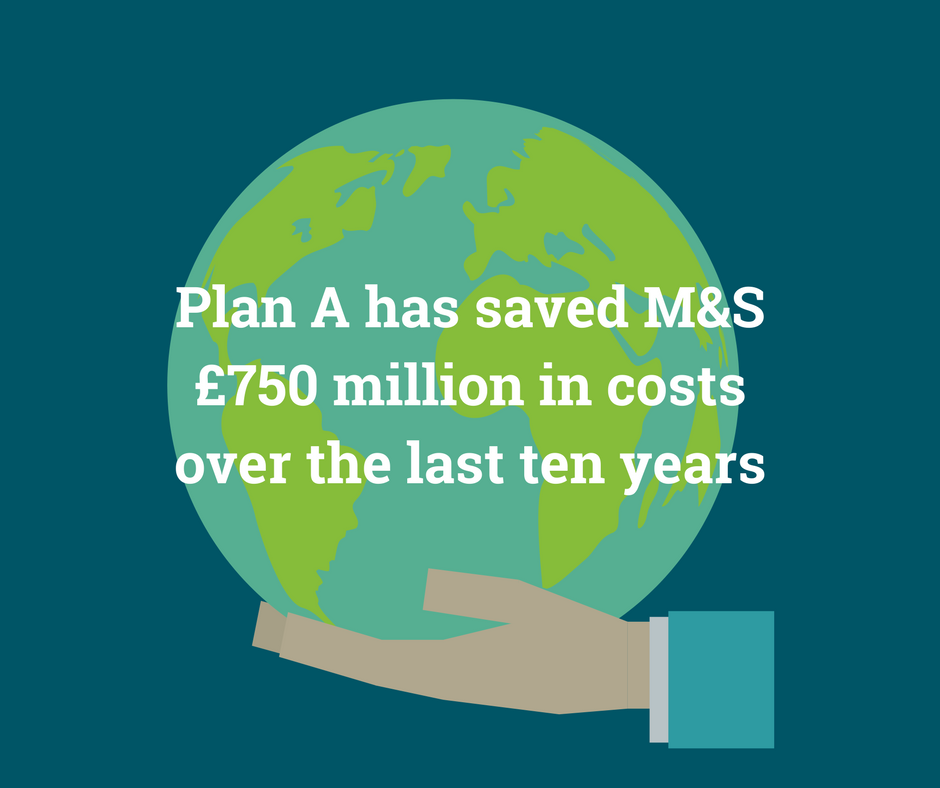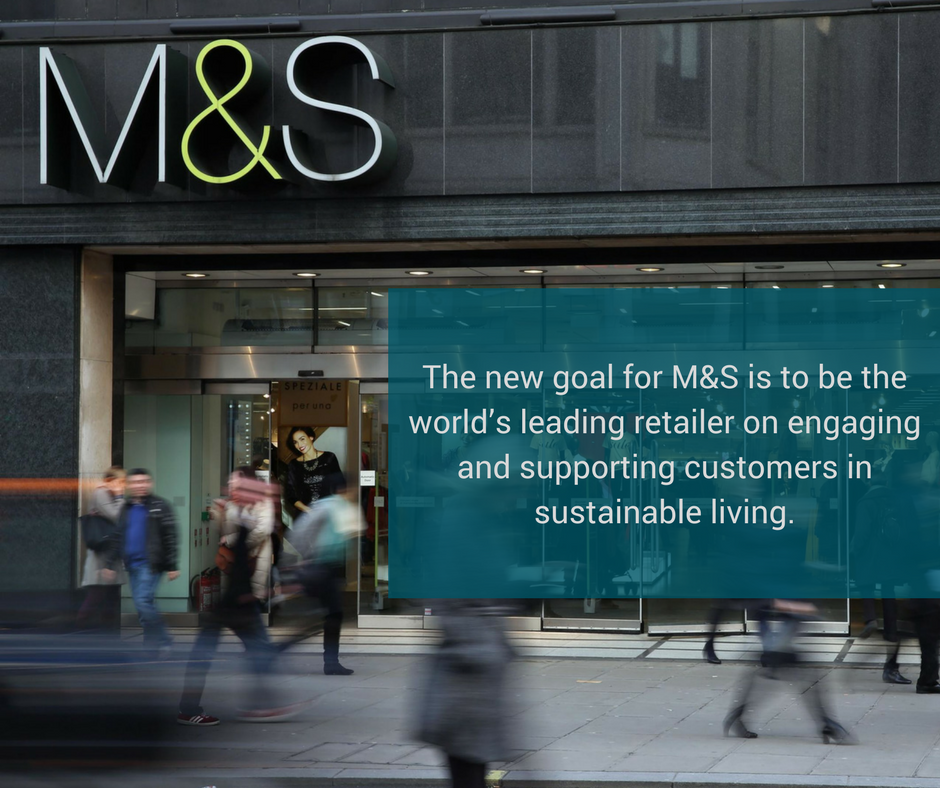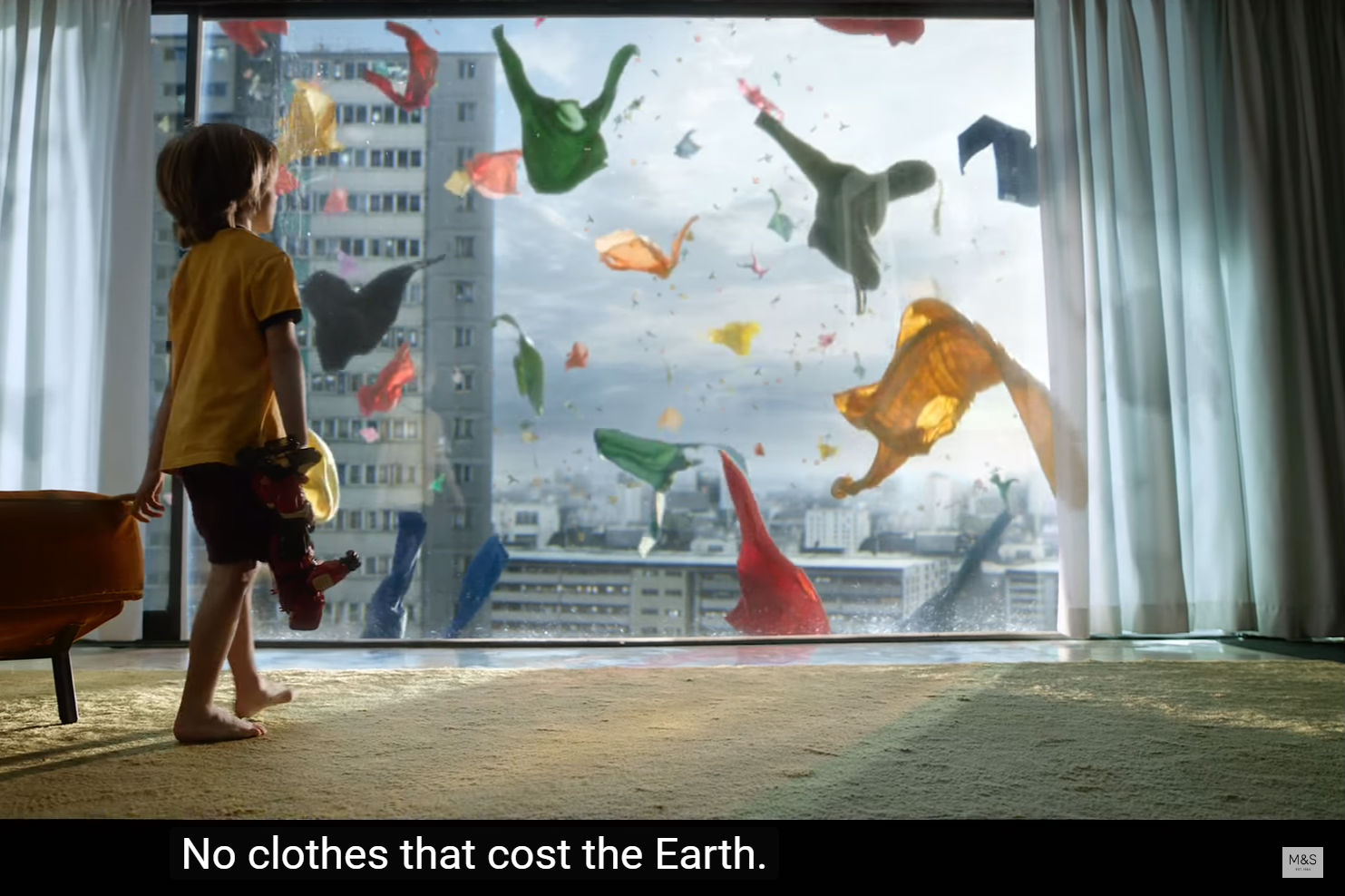M&S Sustainability Programme Plan A turns 10 and has saved £750 million in costs
Each year M&S holds an event solely for stakeholders, to discuss their sustainability challenges, successes and goals. Our Senior CSR Adviser Darina Eades attends this meeting and here she shares the insights from the day and the successful evolution of M&S’s sustainability strategy.
Plan A – A Remarkable Success Story
For the last number of years, I have been attending the Annual Marks & Spencer Plan A Stakeholder Event, held in M&S HQ in Paddington, London.
I value and appreciate these two hours of time. Led by the CEO, the Senior Team of M&S share the podium and in turn, talk about the deeply integrated and unswerving commitment to sustainability that is the M&S Plan A Strategy since its inception in 2007. They focus on the successes achieved in reaching particular targets during the year, the challenges that continue to be faced and the ever-stretching vision.
As a Sustainability Adviser, this event provides a great opportunity to hear first-hand from those at the helm of a Globally-Leading Sustainability Strategy. Following the information sharing, it’s possible then to ask questions directly of CEO Steve Rowe and the senior team, in a session chaired by their Head of Sustainable Business (and BITCI Board Member) Carmel McQuaid (who incidentally hails from Dundalk).
In bringing together their external stakeholders year on year, solely on the topic of the Sustainability Strategy, to hear the most up to date information and ask questions of the senior team, M&S stands apart from other companies. M&S takes an already deeply serious approach to stakeholder consultation to another level.
Over 133 years in business, M&S employs 2,800 in Ireland and works with 26 Irish suppliers. 85,000 people are employed globally.
In launching their sustainability strategy in 2007, Marks & Spencer set themselves the goal to become the most sustainable retailer in the world by 2015. They called their strategy, Plan A, “because there is no Plan B”. In 2010, they had achieved their goal 5 years early. Since that time, they have unremittingly continued to set themselves further challenging targets on environmental efficiency, social progress and innovation.
Plan A has saved M&S £750 million in costs over the last ten years. Plan A 2025, launched in June this year, is the latest iteration of the strategy. Here are some examples of the work done to date and the plans for the next phase:
Since 2012, Marks & Spencer has sent zero waste sent to landfill. Or to put it another way, for the last five years, 100% of operational waste from M&S stores, offices, warehouses and construction (both in the ROI and the UK) has been recycled.
Plan A 2025
Plan A 2025 has set a new goal: to be a zero waste business across all operations, including the full supply chain (comprising 2100 suppliers!). Very cool is the fact M&S will be focusing on promoting how food waste can be prevented by customers in their own homes. They are also improving the design of their food packaging so that it can be more widely recycled (this will necessitate actively collaborating with other companies to bring about changes in local government recycling policy). Already packaging reductions have been achieved in their ranges of popcorn & hand-cooked crisps with pack sizes reduced by 37% & 20% respectively, leading to 75 tonnes of packaging being saved annually just in this area alone.
What has been achieved

Since 2007, M&S has reduced its absolute carbon footprint by 70%. M&S is 39% more energy efficient in 2017 than it was 2007. 27% of gas consumption has been replaced with bio-methane.
100% of the electricity used by the 17 M&S stores in the Republic (and all UK stores) is from renewable sources. 100% of electricity used globally is from renewable sources! M&S is 27% more water efficient in ROI & UK than it was in 2007 and rainwater harvesting is the norm.
The new plan includes a science-based target to further improve operational efficiency and reduce 13.3m tonnes of CO2 emissions for the M&S value chain by 2030, towards a 90% reduction by 2035. I particularly like that they have a goal to stop the air freight of clothing and home products in the logistics supply chain by 2025.
One of the first actions taken under Plan A in 2008 was to remove all artificial colours and flavourings in M&S food. Sustainable sourcing then became a key priority. Currently, 100% of M&S coffee and tea, 100% of fish, 100% of palm oil, 99% of wood and 49% of M&S cotton come from sustainably-certified sources. For Plan A 2025, M&S has set a goal that 100% of the key raw materials in products will come from sustainable sources – this will apply to cotton, sugar, cocoa, fruit, vegetables, wool and leather.
Rated as the top retailer in the inaugural (March 2017) Corporate Human Rights Benchmark, M&S is about to embark on a new collaboration with Oxfam to tackle issues such as in-work poverty and the living wage in the supply chain and in partners’ businesses. Advancing women’s human rights and combating gender discrimination will be addressed through new initiatives by 2019 to promote women’s empowerment specifically.
Engaging customers in sustainable living

More than 750,000 customers have already been consulted with directly. Simplified messaging is becoming the order of the day. For the first time, advertising for Food, Clothing & Home is now being done under one banner, #Spend it Well.
You will be interested to know that by 2019, the M&S indulgent food range will have 20% less calories, saturated fat and added sugar compared to 2017. Soon single sized portions of snacks and confectionery will each contain no more than 250 calories and customers will be incentivised to make healthier choices.
The personal well-being of employees and customers is also being prioritised focusing on mental well-being “to ensure people are connected as well as physically healthier”. It will be interesting to see how this will be rolled-out.
M&S with Business in the Community Ireland
In Ireland, for over 17 years, M&S has been the Lead Sponsor of the Business in the Community Ireland Skills @ Work Programme. This programme provides post primary school students, in 5th or 6th year, with a unique insight into the world of work. Sessions involve a Visit to the Company, a Workshop in How to Write a CV, Mock Interviews and A Day in the Life Insight to a range of different roles in the company and the progression route to same. As a result of the pioneering and leadership role taken by M&S, 146 companies across Ireland are involved in the Skills @ Work programme.
In addition to being the Programme Lead Sponsor, six M&S stores are also partnering with six post primary schools – in Dublin, Cork, Killarney, Galway, Clonmel, Co Tipperary and Letterkenny, Co Donegal. For 17 years, this company has relentlessly continued to have an extraordinarily positive impact on the lives of thousands of second-level students the length and breadth of Ireland.
Since 2002, Marks & Spencer has also been the Lead Sponsor of the Ready for Work Programme (also run by BITCI) which provides Training and Work Placements to people who face significantly high barriers in getting work. Since 2002, M&S in Dublin has been responsible for 235 people moving from homelessness and addiction into employment.
Building on the long tradition of M&S supporting their neighbouring community, Plan A 2025 is looking for M&S stores to be play an even further transformative role in communities. 10 communities are being prioritised in the first instance (including Derry in Northern Ireland) where stores and staff will be engaging in a range of activities to make a positive and measureable difference to the neighbourhood. This approach will then be rolled out to 100 more communities by 2023.
An award winner and an inspiration
Marks & Spencer is one of Ethisphere’s 2017 World’s Most Responsible Companies. Plan A has also won more than 240 awards including the Corporate Register Reporting Award 2017 for the Best Overall Global Sustainability Report (2016 Plan A Report); the UK National CSR Award 2017 for a Green Supply Chain, in Partnership with WWF-UK; and the Carbon Clear Reporting on Carbon Emissions 2016 Award for being the Top Retail Performer.
In 2014, M&S achieved the Chambers Ireland Award for Outstanding Achievement in CSR and is one of only 25 companies in Ireland certified by the NSAI to the Business Working Responsibly Mark. M&S has also mapped Plan A to the UN Sustainable Development Goals 2030.
In working in the field of sustainability for over 17 years, educating companies in Ireland on the benefits of integrating sustainability into companies operations and then supporting them on how to do it through strategy development, I can personally credit Marks & Spencer with being one of the companies that has greatly energised and inspired me.
Delve into the detail:
The 2017 M&S Plan A Report is this year’s update on Plan A’s sustainability targets launched in 2007. The 2017 M&S Annual Report is aimed at investors and shows how total value creation is connected to sustainability performance. Plan A 2025 is the company’s newly launched, customer focussed sustainability framework and targets.
The 2017 Human Rights Report reflects the company’s approach to Human Rights and provides an update on the first report published in 2016.
Tags:




